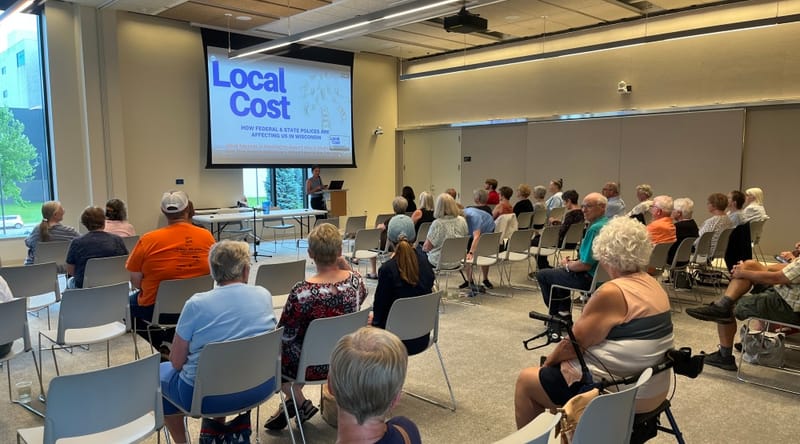Return to Office policy disrupting lives and impacting veterans' critical services
To Nycol Kohlhagen it all seems so unnecessary given that everything she does can so easily be done at home. She takes her job seriously and she says the people she works with do as well.

Nycol Kohlhagen loves what she does for a living. She finds it fulfilling and purposeful.
She’s good at it too, having moved up three levels over the past two years.
When she was promoted in 2023, Kohlhagen went through an intensive sixth-month training program just to qualify for the complex and hyper-specific duties she was being tasked with.
Now, on her ninth anniversary with the Veterans Administration, she talks about the frustration and heartache of having to switch careers.
Kohlhagen was given a choice early in the Trump administration: start coming into the office five days a week or retire. Worse, she was told in the email that gave her the sudden and unexpected ultimatum that as “an essential employee” she probably wouldn’t qualify for deferral, or severance.
It’s all part of Trump’s RTO – or Return to Office – policy that, like so many of his other edicts over the first three months of his administration would seem to defy explanation. Kohlhagen is at pains to make sense of it.
“I mean, to me it’s just so they can get a reduction in workforce,” says Kohlhagen, who has worked the past two years from home for the Milwaukee regional office helping veterans begin the process of applying for benefits. “They’re saying that there’s waste and I guess, like in any company, there’s going to be waste and abuse. But I think that, instead of just a blanket on everyone, it should be more scrutinized and looked at carefully because I have a long queue of veterans that I work with everyday and those aren’t going away.”

Trump has cut 80,000 workers from the Veterans Administration, significantly reducing what is already agreed to be an understaffed institution and leaving our nation’s veterans even more underserved and frustrated.
Kohlhagen, who grew up in northern Wisconsin, went to UW-Oshkosh and has spent the past 15 years living in a quiet neighborhood in north Appleton. She has two daughters, ages 9 and 11, and a husband who also has a career in the area. Picking up and moving to Milwaukee would represent a major disruption for her entire family to the point of being impractical.
To Kohlhagen it all seems so unnecessary given that everything she does can so easily be done at home. Her job as veterans’ service representative is to begin the claims development for any veteran seeking benefits. It requires a lot of research and investigation just to start the process of making certain they have earned the benefits they are seeking.
“I find out, were they hurt in service and what exactly happened,” she explains. “And then I send it in for exams, it gets rated, promulgated and authorized. There are multiple steps.”
Trump’s RTO priority is based, most think, on his idea that the government should be run like a business. But since COVID many businesses offer a work-from-home option, which not only can result in potential savings to a company but offers an employee real benefits as well, such as savings on exorbitant childcare. Ironically, that is an issue that Trump and the Republican Party have ignored, meaning they are exacerbating a problem they’ve yet to deal with.
And Kohlhagen undergoes comprehensive performance reviews, all of which have been exceptional as she has moved from GS-6 to GS-9 and was about to be promoted to GS-10 in early May. May 5 is slated as her final day if she isn’t able to get a deferral and leave early.
“So my first year (as a service representative) you have to meet certain numbers,” she says. “And it’s not just quantity but quality. And I met those numbers to get the promotions I did. And we have a tracking system and you have to meet certain percentages. So, yes, it’s very well documented. And now in my second year I’m on track for another promotion. And you know, throughout the years I’ve always done good to excellent work because I care about what I do.”
Kohlhagen began with the VA nine years ago working in the Appleton office on the health care side, making appointments and providing community resources for veterans. She says she understands the VA is not perfect and that veterans are right to be frustrated by long waits for the benefits they need. But she takes her job seriously and she says the people she works with do as well.
“I was happy just to be able to make a difference,” she says. “And the veterans, even with how frustrated they might be, were always pleasant. And I tell them, thank you for your service. It’s just nice to know that they are going to get what they deserve.”
Kohlhagen thinks that automation will begin to take the place of humans but she’s not sure how practical that is. Even if one were to use word filters or even AI she’s not certain how that would work with, among other things, the handwritten reports for Vietnam veterans.
'We're all struggling'
“Even with work filters it’s still going to require someone to scrutinize it and apply critical thinking to it,” she says. “I just don’t see that happening right away. Maybe someday, I don’t know. And they talk about fraud, waste and abuse but I mean they should find it then and not just say it’s there and then you’re risking people’s jobs and for what?
“You’re probably going to end up having to rehire people but veterans are going to lose. It’s unfortunate because I’m sure it’s going to create problems.”
Then, too, the RTO policy would seem to be at odds with the downsizing of federal infrastructure the administration has also put in force. Less infrastructure for more workers doesn’t add up, says Kohlhagen. She knows the Milwaukee VA office well, having commuted to her job one day a week these past two years. She says parking is already insufficient even before RTO takes effect. There is talk about people parking at Target and taking a bus in. They are being told that parking on the street is not a good option because employees would be forced to feed the meters every hour or risk a ticket.
Still, while Kohlhagen is understandably upset by the loss of a job she loved, saying every day is a roller coaster of emotions and often filled with stress, she appreciates that she has it better than many of her co-workers who are being impacted by this, as many as 30 in Northeast Wisconsin she estimates.
She has a husband with a job, she says, and while her family needs two incomes, at least she has time to find another job. She had an interview with Outagamie County this week.
Kohlhagen has a friend who, like in other government institutions, was targeted because she was listed as “probationary,” a tag that DOGE mistakenly thought meant either new or under disciplinary scrutiny. In fact, the term almost always applies to someone who has just received a promotion to a new department. So the best workers are the first to be shown the door.
“She’s worked for the VA longer than I have,” she says. “This whole thing is just not well run or understood and they’re not thinking about who they’re actually getting rid of. I can’t imagine that just because you got a probation you’re now on the chopping block.”
As far as morale, she says she understands it is not good.
“We’re all definitely struggling,” she says. “I think it’s just stress. I’m sure it’s affecting quality of work. People are just so uncertain about what’s going to happen because I can only imagine there are going to be more layoffs after this deferral.
“I just can’t imagine it’s going to end well.”






